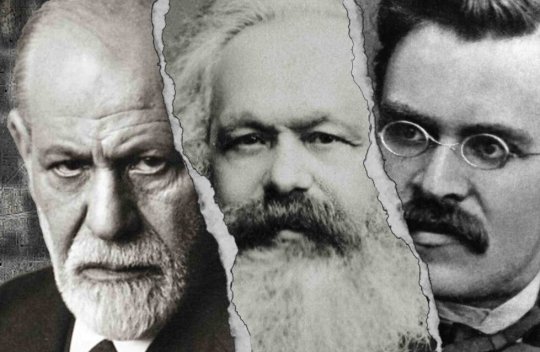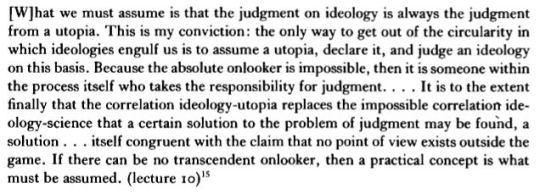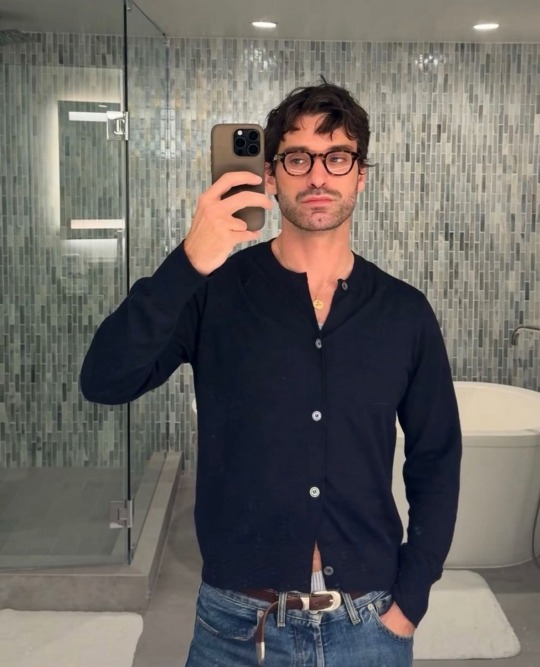#Ricoeur
Text

«Entonces lo que distingue a Marx, Freud y Nietzsche es la hipótesis general que interesa a la vez al proceso de la conciencia "falsa" y al método de desciframiento. Ambos van juntos, porque el hombre de la sospecha hace en sentido inverso el trabajo de falsificación del hombre del ardid. Freud ha entrado en el problema de la conciencia falsa por el doble pórtico del sueño y el síntoma neurótico; su hipótesis de trabajo tiene los mismos límites que su ángulo de ataque: será, como se ha de decir ampliamente más adelante, una económica de las pulsiones. Marx ataca el problema de las ideologías en los límites de la enajenación económica, esta vez en el sentido de la economía política. Nietzsche, situado en el eje del problema del "valor" —de la evaluación y la trasvaluación— busca por el lado de la "fuerza" y la "debilidad" de la Voluntad de Poder la clave de las mentiras y las máscaras.
En el fondo, la Genealogía de la moral en el sentido de Nietzsche, la teoría de las ideologías en el sentido marxista, la teoría de los ideales y las ilusiones en el sentido de Freud, representan tres procedimientos convergentes de la desmistificación.».
Paúl Ricoeur: Freud, una interpretación de la cultura. Siglo XXI Editores, pág. 34. México, 1990.
TGO
@bocadosdefilosofia
@dies-irae-1
#paúl ricoeur#ricoeur#marx#nietzsche#freud#una interpretación de la cultura#ideología#enajenación#enajenación económica#conciencia#conciencia falsa#falsa conciencia#sospecha#hombre de la sospecha#hombre del ardid#filósofos de la sospecha#maestros de la sospecha#mistificación#desmistificación#desciframiento#economía#economía política#pulsiones#voluntad de poder#evaluación#transevaluación#genealogía de la moral#marxismo#teo gómez otero
2 notes
·
View notes
Text
This essay examines the recent critical debate on the hermeneutics of hospitality. It explores the philosophical and ethical implications of Paul Ricoeur’s notion of linguistic hospitality as a translation between host and guest, enemy and friend, and compares it to Derrida’s notion of impossible hospitality.
In On Translation, Ricoeur spells out important implications of this paradigm of linguistic hospitality:
Translation sets us not only intellectual work … but also an ethical problem. Bringing the reader to the author, bringing the author to the reader, at the risk of serving and of betraying two masters: this is to practice what I like to call linguistic hospitality. It is this which serves as a model for other forms of hospitality that I think resemble it: confessions, religions, are they not like languages that are foreign to one another, with their lexicon, their grammar, their rhetoric, their stylistic which we must learn in order to make our way into them?
A crucial step in resisting the lure of the Perfect Translation is to honor a dialectical balance between proximity (welcoming the stranger into our midst) and distance (acknowledging that something is always lost in translation: the other’s meanings can never be completely mine).
4 notes
·
View notes
Text

jaoven ricoeur
13 notes
·
View notes
Quote
I find myself only by losing myself.
Paul Ricoeur
#Paul Ricoeur#quotelr#finding#quotes#literature#life quotes#author quotes#prose#lit#spilled ink#writers on tumblr#writing inspiration#poets on tumblr
21 notes
·
View notes
Quote
I find myself only by losing myself.
Paul Ricoeur
#Paul Ricoeur#thepersonalwords#finding#quotes#literature#life quotes#author quotes#prose#lit#spilled ink#writers on tumblr#writing inspiration#poets on tumblr
18 notes
·
View notes
Text
I found in the concept of intrication (muthos) [mise en intrigue] the inverse response of Augustine’s distentio animi. Augustine groans under the existential burden of discordance. Aristotle discerns under the poetic act par excellence—[i.e.,] the composition of the tragic poem— the triumph of concordance over discordance.
Paul Ricoeur, Temps et Récit (1983, 55)
3 notes
·
View notes
Text
Does a painter like Cézanne make a version of the world in the same way as one makes a car? The deep thrust that moves him to paint, and which is the origin of that which Merleau-Ponty describes as "Cezanne's Doubt" in a famous essay, seems to arise from a stubborn attempt to "render" what he keeps calling Nature (with a capital N).
My contention is that making and rendering are not substitutable terms but form together a dynamical and dialectical pair at the phenomenological level. Tell a creator, say Van Gogh or Cézanne, that he is fabricating a world-version. He will not recognize himself in this account of what he is doing. And if by chance he accepted it, he would stop painting, because he would lose faith in the kind of constraint which makes his predicament. The painter — at least this kind of painter — understands himself as the servant — if not the slave — of that which has to be said, depicted, exemplified, expressed. Because a gap keeps recurring between making and rendering, he is never relieved from the duty of painting. Cézanne, facing "la montagne sainte Victoire" or simply ... un "compotier de pommes," feels himself the bearer of an infinite debt as regards that which Merleau-Ponty calls the visibility of the visible. By the way, the English word "to render" displays a full array of potential meanings ranging from "making" to "giving in return or requital," even to "giving up" and "surrendering." The experience of the artist, it seems to me, encompasses the whole range of meanings from making to surrendering, through representing and interpreting.
Paul Ricoeur, review of Nelson Goodman’s Ways of Worldmaking
19 notes
·
View notes
Text
I think I'm undergoing now the crisis of the first naïveté and idk when it'll ever end. Help.
2 notes
·
View notes
Text
The sudden and abrupt end of all homestuck everything (except that pop up cafe somehow??) is perhaps the most thematically on brand ending for the property.
From what I can tell, the entire IP has been functionally abandoned to the wolves. Or rather feral barkbeasts. Which means that there’s no canonical or fanonical (god I hate what this stupid comic makes me type) or whatever ending. Which, yeah, sounds about right.
As much as I loathe the whole “great works of literature are fanfiction” argument (they’re not, you’ve fundamentally misunderstood iterative culture and the concept of media), there is a degree to which an absence is always an invitation. The history of human culture is the history of reinterpreting old stories in light of new experiences, ideas, and beliefs. To analyze the Aenid, The Comedia, or Paradise Lost as fanfiction is to miss the much more interesting observation that through iteration, we demonstrate a sincere desire to make ourselves a part of something meaningful. Dante was not a ‘fan’ of Christian mythology, he was a devout man using the language and imagery of revelation to create a sense of continuity between his often radical ideas and the cultural context into which he was speaking them. It was the voids in Christian narratives about death, eschatology, and theology that allowed for him to do so. To put it in more accessible terms, he was a Rogue of Void, creating in spaces between that which already was.
As a part time culture critic and full time insufferable prick, I too am just trying to fill in a void, albeit a hermeneutical one. How am I supposed to interpret this absence of both continuity and end? Well, obviously with the themes, images, and motifs already present within the original work. This absence is, it seems, itself the thematic ending to the story. I previously referred to absences as invitations, but it’s best not to think of them as being intentional, even when they are. Rather, an invitation requires that invited perceive the invitation. They are dyadic. What is intended is completely irrelevant as a narrative exists almost wholly in the interpretation of it. When I say that the absence is an invitation, I mean that it is a hole which our minds, prefigured from the start to construct and interpret narratives, seek to fill. We invite ourselves to fill these absences regardless of the author’s will.
This is, in no small part, a running theme throughout homestuck. I’ve already implied that Roxy’s power is interpretive, but it runs throughout. The original comic ends with an amount of narrative ambiguity that only reinforces the notion that the rest is up to interpretation. There is no right answer to the question ‘what happens next’ because the right answer is that you were gonna come up with one on your own anyway, so fuck it. Thus, it stands to reason that the ultimate thematic conclusion of homestuck would be a total void into which literally anything (okay not literally anything, let’s not be absurd) could be read.
Oh fuck me, why did I spend half an hour writing this instead of finishing my thesis. Goddamn it.
#Homestuck#god i hope no one reads this#honestly#Ive spent a nontrivial amount of time studying hermeneutics and this is what I do with that knowledge?#Im sorry ive disgraced you paul ricoeur#wait#why tag this if i don’t want people to read this?#in order to bring the theme full circle here in the tags
5 notes
·
View notes
Text
“I find myself only by losing myself.”
― Paul Ricoeur
4 notes
·
View notes
Text
was trying to explain a segment of my first chapter to my dad (which i have entitled "modulating the experience of language") and i used gretchen mcculloch's Because Internet (luv that book thanks tumblr for the rec), and i referenced that post that's like "the art of. using periods incorrectly"
this segment is about the evolution of language, molded to fit our needs, and the flexibility that we can afford one another on an interpersonal level, closing the distance between writer and reader etc etc etc.
but what i said was "we play with words like jpegs," forgetting that paper dolls was the jpegs thing. anyway you are all on tumblr, you all understand me
#thesisposting#we DO play with words like jpegs though. stop booing me im right#the other 2/3 of the chapter is about hermeneutical functions of analyzing text and action as text. i am holding hands with paul ricoeur
2 notes
·
View notes
Text

Paul Ricoeur, *Lectures on Ideology and Utopia* (1986)
5 notes
·
View notes
Text

jaoven ricoeur
15 notes
·
View notes
Text
The truth, is something that we missed it; as if it is an obsolete concept that we do not need anymore, but don't we? I think it never get old, always the truth is necessary. Here is an account of truth in a new meaning which introduced first by Heidegger then advanced by thinkers like Gadamer and Ricoeur. Any comment would be appreciated.
2 notes
·
View notes
Text
When an idea is conceived as forcing another according to the necessity of contiguity or resemblance, when the object of my desire not only attracts my observation, but also draws it, occupies it, captures it, absorbs it, when the form and the content become distributed and reorganized according to laws of stress imposed by the distribution and reorganization of tensions issuing from the very forms of needs and quasi-needs constituting the total field, it is no longer I who orient myself. The “observing” has vanished, merged into its contrary: I have become a victim of the object.
Paul Ricoeur, Freedom and Nature: The Voluntary and the Involuntary
2 notes
·
View notes
Text
youtube
TODAY IN PHILOSOPHY OF HISTORY
Paul Ricœur and Rendering What Is Due to History
Tuesday 27 February 2024 is the 111th anniversary of the birth of Jean Paul Gustave Ricœur (27 February 1913 – 20 May 2005), who was born in Valence, France, to a Huguenot family on this date in 1913.
Ricœur was, by turns, a providential and phenomenological philosopher of history for whom theology was a central concern, but that did not for Ricœur dictate a providential philosophy of history such as we find in Augustine or Bossuet. Ricœur offers us striking formulations of traditional problems in the philosophy of history and so provides us with new tools for understanding history.
Quora: https://philosophyofhistory.quora.com/
Discord: https://discord.gg/r3dudQvGxD
Links: https://jnnielsen.carrd.co/
Newsletter: http://eepurl.com/dMh0_-/
Podcast: https://podcasters.spotify.com/pod/show/nick-nielsen94/episodes/Paul-Ricur-and-Rendering-What-Is-Due-to-History-e2gclnp
0 notes